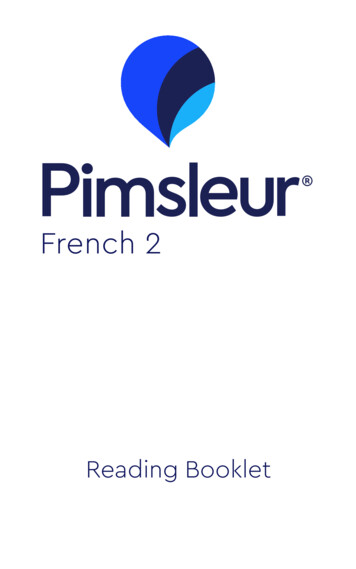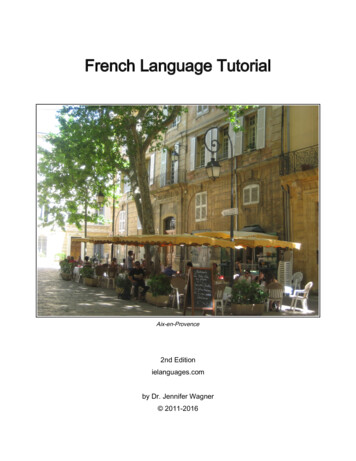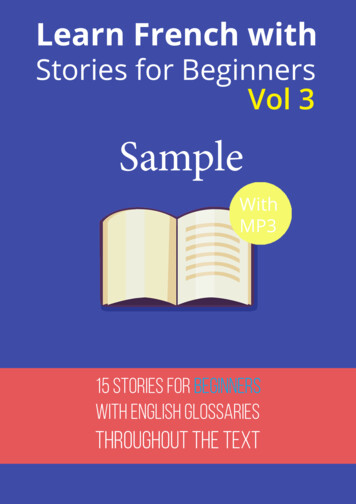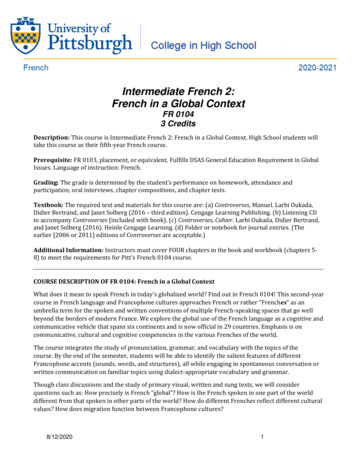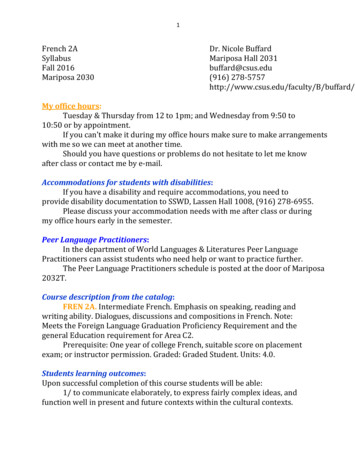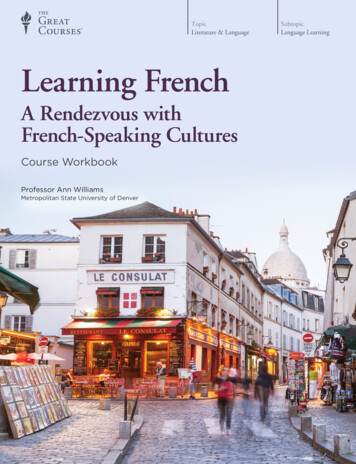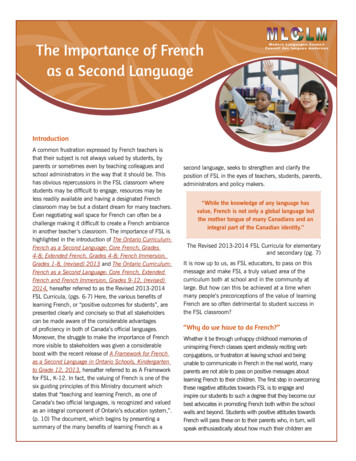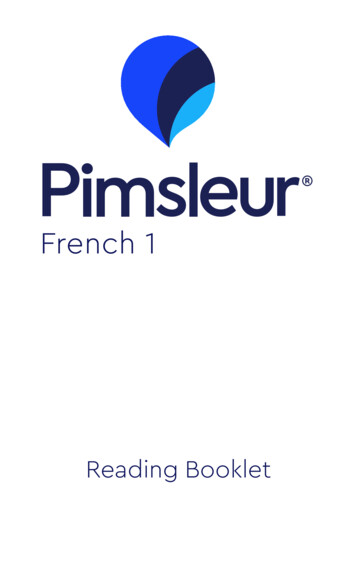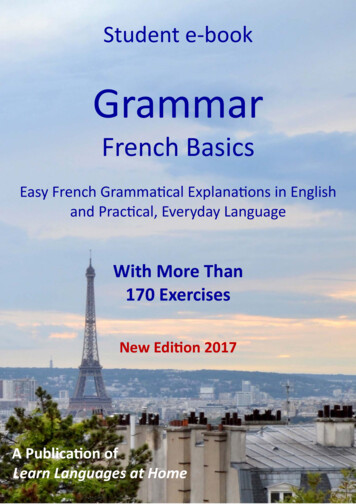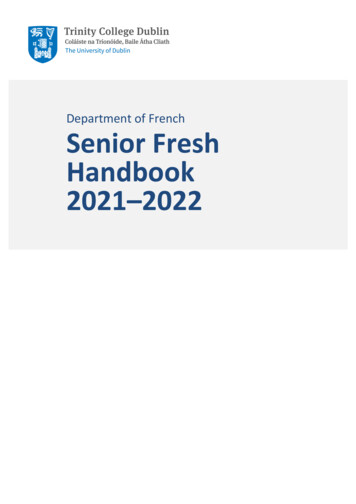
Transcription
Department of FrenchSenior FreshHandbook2021–2022
Lecturing StaffIndividual telephones can be accessed from outside College by pre-fixing (01) 896; emailidentifiers are followed by @tcd.ieDr Sarah Alyn Stacey, room 4105, tel. 2686, email salynsta Dr Edward Arnold, room 4106, tel. 1836, email ejarnold Professor Michael Cronin (Chair of French), room 4090, tel.2278, email croninm8 Dr James Hanrahan (Head of Department, on research leave on HT 2022), room 4107, tel. 1841,email hanrahaj Dr Rachel Hoare, room 4108, tel. 1842, email rmhoare Dr Alex Lukes, room 4104, tel. 1977, email lukesa Dr Hannes Opelz (on Research Leave in MT 2021), room 4111, tel. 1077, email opelzh Dr Paule Salerno-O’Shea, room 4113, tel. 1472, email psalerno Florence Signorini, room 4103, tel. 2313, email fsgnorni Dr Niall Kennedy, email nikenned Teaching AssistantsJulie Boustie, email boustiej Alexandra Corey, email coreya Agathe Ferreira, email ferreiag Robin Gatel, email gatelr Laura Gautron, email gautronl Assaya Hamdani, email hamdania Luke Warde, email wardel Lectrices/lecteursJeremy Caux, email cauxj Nina Milonet, email milonetn Maud Quilici, email quilicim Language AssistantsClotilde Borg, email TBC Adélaïde Malval, email TBC Floriane Renaux, email TBC Francesca Sanvicente, email TBC Executive OfficerMs Mary Kelly, room 4109, tel. 1553, email french Term DatesMichaelmas Term (MT): Monday 13 September 2021 - Friday 3 December 2021Hilary Term (HT): Monday 24 January 2022 - Friday 15 April 20221
General CoordinationSF year coordinator:Dr James Hanrahan (MT)Dr Hannes Opelz (HT)SCHOL coordinator:Dr Alex LukesTJH Study Abroad coordinator:Dr Alex LukesLaw & French coordinator:Dr James Hanrahan (MT)Dr Hannes Opelz (HT)ES & MEELC coordinator:Dr Edward ArnoldES & MEELC Study Abroad coordinator:Dr Edward ArnoldCSL coordinator:Dr Rachel HoareModule CoordinatorsOral & Written French (FRU22001/2):Dr James Hanrahan (MT)Dr Hannes Opelz (HT)Early Modern French Literature (FRU22041):Dr Sarah Alyn StaceyModern French Literature (FRU22012):Professor Michael CroninEarly Modern Political Thought in France (FRU22051):Dr James HanrahanModern Political Thought in France (FRU22022):Dr Edward ArnoldFrench in the 21st century (FRU22081):Dr Rachel HoareDr Niall KennedyThe Diversity of the French-Speaking World (FRU22092):Dr Rachel HoareDr Niall Kennedy2
COURSE STRUCTUREDepending on your pathway, which you chose over the summer, students take either 20credits in French (Joint Honours French or French as a Minor) or 40 credits in French (SingleHonours French or French as a Major). All students take two compulsory term-long languagemodules (2 x 5 ECTS), one per term, and then choose either one or three term-long optionmodules per term, depending on their credit requirements.In order to reach the required total of 20 ECTS credits, students take the following:LANGUAGE MT (5 ECTS)OPTION 1 MT (5 ECTS)LANGUAGE HT (5 ECTS)OPTION 2 HT (5 ECTS)In order to reach the required total of 40 ECTS credits, students take the following:LANGUAGE MT (5 ECTS)OPTION 1 MT (5 ECTS)OPTION 2 MT (5 ECTS)OPTION 3 MT (5 ECTS)LANGUAGE HT (5 ECTS)OPTION 4 HT (5 ECTS)OPTION 5 HT (5 ECTS)OPTION 6 HT (5 ECTS)AssessmentEach module has its own assessment requirements (examinations, written assignments, oralpresentations, reports, etc.) and deadlines, which are described in further detail below.AttendanceStudents are reminded that attendance is compulsory. Poor attendance may result in therefusal of permission to sit annual examinations. According to the regulations as set out inthe College Calendar (H6, §§ 23, 24, 25) a student’s performance may be deemed nonsatisfactory (NS) where they fail to attend one third of their course or fail to submit one thirdof their coursework. In SF French, this regulation is interpreted as follows: a student’sperformance is deemed non-satisfactory where s/he misses three or more classes in a givenmodule.NB. This Handbook should be read in conjunction with relevant entries in the University Calendar. In case of anyconflict between the Handbook and the Calendar, the provisions of the Calendar shall apply. Copies of theUniversity Calendar can be purchased or consulted either in the Library or on the web at:http://www.tcd.ie/Secretary/role/calendar/.3
LANGUAGE (10 ECTS)To complete the Language course, all students (TJH, ES, CSL, MEELC, L&F) take the followingterm-long French grammar module(s):Oral & Written French MT (FRU22001)Oral & Written French HT (FRU22002)Module CoordinatorDr James Hanrahan (MT)Module DescriptionFollowing on from the French language course of the JF year, this module aims to furtherconsolidate and develop competence and fluency in French, based on the four basic linguisticskills of listening, speaking, reading and writing.In each term of Oral & Written French, there are three compulsory contact hours per week.These are supplemented by independent learning with the help of online grammar notes andonline tests to practice grammar. Each week, students prepare and complete a number ofgrammar exercises and submit three continuous assessment assignments per term (threetranslations in MT and three compositions in HT). For full details on assessment, studentsshould consult the Written Language Dossier, available on Blackboard.Module DescriptionOn successful completion of these two modules students will be able to: Communicate clearly and effectively, both orally and in writing, in English and Frenchin academic, professional and social settings. Organise and present ideas in English and French, in writing and orally, within theframework of a structured and reasoned critical argument. Translate a range of journalistic texts into English, with accuracy, consistency andappropriateness of register and expression. Demonstrate a high level of proficiency in the French language in both written andspoken contexts. Analyse critically and independently, in English and French, a variety of texts writtenin French in a variety of registers.TextbookMargaret Jubb and Annie Rouxville, French Grammar in Context, 4th edition (Routledge,2014). Available as an e-book for free from the TCD Library website or for purchase atInternational Books.Reference GrammarRoger Hawkins and Richard Towell, French Grammar and Usage, 4th ed. (Routledge, 2015).Available as an e-book for free from the TCD Library website or for purchase at InternationalBooks.Assessment4
Your mark for FRU22001 Oral and Written Language (MT) will be calculated on the basis ofmarks awarded for two components (all assignments are completed during the teachingterm): 3 x continuous assessment assignments (80%)1 x online grammar test at the end of term (20%)In the event that students fail FRU22001 overall, they will be required to re-sit all failedcomponents in the Reassessment Exam Session if they have not met the requirements topass the module by compensation. The reassessment components in FRU22001 are thefollowing: 1 x continuous assessment assignment (80%)1 x online grammar test (20%) [completed prior to Reassessment Exam Session, dateTBC]Your mark for FRU22002 Oral and Written Language (HT) will be calculated on the basis ofmarks awarded for three components (apart from the oral, all assignments are completedduring the teaching term): 3 x continuous assessment assignments (60%)1 x online grammar test (10%)1 x oral exam (30%)In the event that students fail FRU22002 overall, they will be required to re-sit all failedcomponents in the Reassessment Exam Session if they have not met the requirements topass the module by compensation. The reassessment components in FRU22002 are thefollowing: 1 x continuous assessment assignment (60%) [submitted prior to Reassessment ExamSession, date TBC]1 x online grammar test (10%) [completed prior to Reassessment Exam Session, dateTBC]1 x oral exam (30%) [date TBC]Visiting studentsVisiting students at Trinity may take FRU22001 and/or FRU22002 and are assessed in thesame way as other students.Computer Science & Language studentsIn addition to FRU22001/2, CSL students take FRU22092 (The Diversity of the Frenchspeaking World) in HT. More details on FRU22092 below.Deadlines and markingAll assignments must be submitted by the deadlines indicated (see the Written LanguageDossier for more details). Extensions to the deadline will only be permitted in exceptionalcircumstances and permission must be sought with the instructor before the deadline. Where5
there is medical documentation, students must submit the medical certificate to the FrenchOffice (french@tcd.ie). When no valid reason for lateness has been given, late submissionpenalties will be applied (see ‘Late Submission of Coursework Policy’ in the School Handbookfor more details).Where stated, students must respect the word count for written assignments. Unlessspecified otherwise, students should include an electronic word count and are allowed to goabove or below the stated word count by no more than 10%.All language assignments submitted in French will be marked as follows: 70% of the mark isgiven to grammar and 30% to content. For marking criteria, see the Marking Procedure andCriteria section below.6
OPTIONS (10 or 30 ECTS)Students choose from the following term-long Option modules:MTEarly Modern French Literature (FRU22041)Early Modern Political Thought in France (FRU22051)French in the 21st Century (FRU22081)HTModern French Literature (FRU22012)Modern Political Thought in France (FRU22022)The Diversity of the French-Speaking World (FRU22092)Each Option module (worth 5 ECTS) is made up of one weekly lecture and one weeklyseminar. Each module has its own assessment requirements (essays, commentaries,presentations, reports, etc.) and deadlines, which are described in further detail below.For all Options, students should bear in mind the following: Essay titles and commentary extracts are listed at the end of this document, inthe Appendix. Where no essay titles or commentary extracts are listed, thelecturer(s) will provide assessment details in class.All essays and commentaries must be word-processed. Students must submittheir assignments electronically via Turn-it-in on Blackboard. Work should besubmitted in WORD format (not in PDF).All assignments must be submitted by the deadline (see individual Optionmodule descriptors below for information on deadlines). Extensions to thedeadline will only be permitted in exceptional circumstances and permissionmust be sought with the module coordinator before the deadline. When no validreason for lateness has been given, late submission penalties will be applied (see‘Late Submission of Coursework Policy’ in the School Handbook for more details).Students must respect the word count for written assignments. Unless specifiedotherwise, students should include an electronic word count and are permittedto go above or below the stated word count by no more than 10%.In marking assignments composed in French, 70% of the mark is given to contentand 30% to grammar. (For more details on marking criteria, see the MarkingProcedures and Criteria section below.)For guidelines on essay/commentary writing, see the ‘Tools’ under the FrenchDepartment’s Local Access page: https://www.tcd.ie/French/local/tools.php.For guidelines on class presentations, see below the section ‘Guidelines for ClassPresentations’.ES students take Political Thought in France in either MT (FRU22051) or HT (FRU22022).Students will be assigned by the ES office to either MT or HT groups depending on their othersubjects. For enquiries regarding their French requirements, ES students should contact the7
Centre for European Studies Office (european.studies@tcd.ie) or our departmental EScoordinator, Dr Edward Arnold (ejarnold@tcd.ie).EARLY MODERN FRENCH LITERATUREFRU22041 (5 ECTS) Michaelmas TermModule CoordinatorDr Sarah Alyn StaceyModule DescriptionThe module begins with Du Bellay’s Les Antiquitez de Rome (1558), a seminal work which metwith European recognition (it was, for example, translated by Edmund Spenser). Theselectures consider the virtuoso use of the sonnet to articulate a range of universal andtranshistorical themes about the human condition and our place in the universe. We thenexamine drama, focusing on the Golden Age of French theatre, the seventeenth century, or‘Grand Siècle’. Through an analysis of social satire in Molière’s grande comédie, LeMisanthrope (1666), we will engage with themes such as non-conformity, friendship,happiness and morality. Moving from comedy to tragedy, we will examine Corneille’s Le Cid(1648), a play constructed around the eternally-significant themes of honour, duty, heroism,sacrifice and authority. The study of these two plays will permit valuable insights into boththe dramaturgical conventions and the moral philosophy of the time.This module comprises one weekly lecture (see lecture programme below) and one weeklyseminar. All lectures are given by Dr Alyn Stacey.Module Learning OutcomesOn successful completion of the course, students will be able to: Analyse critically and independently, in English and French, a variety of major literarytexts ranging from the 16th to the 17th century. Demonstrate an ability to use the specific discipline of literature (in particular genericcategories) to analyse and contextualise texts and to examine literary developmentsin France from the 16th to the 17th century. Organise and present ideas in English and French, in writing and orally, within theframework of a structured and reasoned critical argument. Use the appropriate methodologies and relevant resources for the presentation oftheir work.Course TextsJoachim Du Bellay, Les Regrets, précédé de Les Antiquitez de Rome (Paris: Gallimard (coll.NRF), 1975).Molière, Le Misanthrope, ed. Loïc Marcou (Paris: Flammarion, 1998).Corneille, Le Cid (Paris: Petits Classiques Larousse, 1998).8
(The above texts are all available for purchase at International Books. Any good scholarlyedition may be used if the recommended ones are not available but lectures will refer to theeditions given above.)Select BibliographyWhat follows is preliminary. More detailed bibliographies, together with handouts, will bedistributed in class. NB. Two key texts on ‘rhetoric’ should be consulted by students forconstant reference throughout the course: J. D. Biard, Lexique pour l’explication de texte,Exeter: University of Exeter Press, 1980 and G. Forestier, Introduction à l’analyse des textesclassiques, Paris: Nathan, 1993.Du BellayY. Bellenger & J. Balsamo, Du Bellay et ses sonnets romains: études sur ‘Les Regrets’ et ‘Les Antiquitez de Rome’,Paris, 1994.H. Chamard, Joachim du Bellay (1522-1560), Lille, 1900.G. Gadoffre, Du Bellay et le sacré, Paris, 1978.V. Saulnier, Du Bellay: l’homme et l’œuvre, Paris, 1951.H. Tucker, The Poet’s Odyssey: Joachim du Bellay and the ‘Antiquitez de Rome’, Oxford, 1990.H. Weber, La Création poétique en France au XVIe siècle, Paris, 1956 (ch. 6).J. D. Biard, Lexique pour l’explication de texte, Exeter: University of Exeter Press, 1980.Georges Forestier, Introduction à l’analyse des textes classiques, Paris: Nathan, 1993.MolièreA. Calder, ‘On Humour and Wit in Molière’s “Le Misanthrope” and Congreve’s “The Way of the World”’, inCulture and Conflict in Seventeenth-Century France and Ireland, ed. Sarah Alyn Stacey with Véronique Desnain,Dublin, 2004, pp. 151-162.J. Lough, Seventeenth-Century French Drama, Oxford, 1979.M. Turnell, The Classical Moment, New Haven, Connecticut, 1971.W. D. Howarth, Molière: A Playwright and his Audience, Cambridge, 1982.W. G. Moore, Molière: A New Criticism, Oxford, 1949.CorneilleH. T. Barnwell, The Tragic Drama of Corneille and Racine, Oxford, 1982.Lecture Programme Michaelmas TermWeek 1 (3)Introduction to Early-Modern LiteratureSASWeek 2 (4)The Sonnet and the City: Du Bellay’s Antiquitez de RomeSASWeek 3 (5)The Stylistics of Expression: Reconstructing Du Bellay’s Rome (I)SASWeek 4 (6)The Stylistics of Expression: Reconstructing Du Bellay’s Rome (II)SASWeek 5 (7)The Stylistics of Expression: Reconstructing Du Bellay’s Rome (III)SASWeek 6 (8)Molière: Le Misanthrope (I)SASWeek 7 (9)Study WeekWeek 8 (10)Molière: Le Misanthrope (II)SASWeek 9 (11)Molière: Le Misanthrope (III)SASWeek 10 (12) Corneille: Le Cid (I)SASWeek 11 (13) Corneille: Le Cid (II)SAS9
Week 12 (14) Corneille: Le Cid (III)SASAssessmentStudents complete one formal assessed assignment on one of the authors studied over thecourse of the term:1 x essay of 2,000 words in English or French, to be submitted by Monday 13 December at12pm (noon) (100%)For essay topics, see Appendix. Students are invited to discuss their written work with theirtutor in advance of submission. Marks will be awarded for the quality of the analysis, notlength. Please note: this formal assignment is in addition to other work which your tutor mayask you to prepare during the course of the term.EARLY MODERN POLITICAL THOUGHT IN FRANCEFRU22051 (5 ECTS) Michaelmas TermModule CoordinatorDr James HanrahanModule DescriptionThis module aims to acquaint students with the political and ideological traditions of modernFrance, from the Renaissance to the 18th century, exploring in particular the work ofMontaigne, Pascal and Voltaire.This module is made up of one weekly lecture (see lecture programme below) and oneweekly seminar.Module Learning OutcomesOn successful completion of the course, students will be able to: Analyse critically and independently, in English and French, extracts from majorhistorical, political and cultural texts ranging from the 16th century to the 18th century. Demonstrate a broad knowledge of the historical, cultural and political developmentof France from the 16th to the 18th century, as reflected in the texts used in themodule. Organise and present ideas in English and French, in writing and orally, within theframework of a structured and reasoned critical argument. Demonstrate an awareness of the relevant philosophical, political and historicalapproaches to ideas and social and political development of France from the 16th tothe 18th century. Use the appropriate methodologies and relevant resources for the presentation oftheir work. Produce work in both English and French demonstrating the ability to organise,analyse and evaluate relevant material.Course Texts10
Michel de Montaigne, ‘De la coustume et de ne changer aisément une loy receüe’, and ‘DesCannibales’, in Essais, vol. I (Paris: Gallimard (coll. Folio), 1973).Blaise Pascal, Pensées, ed. Dominique Descotes (Paris: Flammarion, 1976).Voltaire, Lettres philosophiques, ed. René Pomeau (Paris: Flammarion, 1999).(The Department will provide students with copies of the two essays by Montaigne. Theother texts are available for purchase at International Books.)Select BibliographyMontaigne, EssaisJanine Garrison, A History of Sixteenth-Century France, 1483-1598, London: Macmillan, 1995.R. J. Knecht, The Rise and Fall of Renaissance France, 1483-1610, London: Fontana, 1996.Pascal, PenséesJohn Cruickshank, Pascal: Pensées, London: Grant and Cutler, 1988.Pascal: Thématique des Pensées, ed. L. M. Heller and I.M. Richmond, Paris, Vrin, 1988.Kearns, Edward J., Ideas in Seventeenth-Century France, Manchester: Manchester UP, 1979.Janet Morgan, ‘Pascal’s “Three Orders”’, Mod Lang Review, 73 (1978), 755-766.Michael Moriarty, Taste and Ideology in Seventeenth-Century France, Cambridge: CUP, 1988.Voltaire, Lettres philosophiquesTheodore Besterman, Voltaire, Oxford: Blackwell, 1976.Nicholas Cronk, The Cambridge Companion to Voltaire, New York and Cambridge: Cambridge University Press,2009.Dorinda Outram, The Enlightenment, Cambridge: Cambridge University Press, 1995.Ira Owen Wade, The Intellectual Origins of the French Enlightenment, Princeton, N.J.: Princeton University Press,1971.Lecture Programme Michaelmas TermWeek 1 (3)Montaigne: Les Essais (I)SASWeek 2 (4)Montaigne: Les Essais (II)SASWeek 3 (5)Montaigne: Les Essais (III)SASWeek 4 (6)Montaigne: Les Essais (IV)SASWeek 5 (7)Pascal: Pensées (I)SASWeek 6 (8)Pascal: Pensées (II)SASWeek 7 (9)Study WeekWeek 8 (10)Pascal: Pensées (III)SASWeek 9 (11)Pascal: Pensées (IV)SASWeek 10 (12) Voltaire: Lettres philosophiques (I)JHWeek 11 (13) Voltaire: Lettres philosophiques (II)JHWeek 12 (14) Voltaire: Lettres philosophiques (III)JHAssessmentStudents complete one formal assessed assignment on one of the authors studied over thecourse of the term:11
1 x essay of 2,000 words in English or French, to be submitted by Monday 13 December 2021at 12pm (noon) (100%)For essay topics, see Appendix. Students are invited to discuss their written work with theirtutor in advance of submission. Marks will be awarded for the quality of the analysis, notlength. Please note: this formal assignment is in addition to other work which your tutor mayask you to prepare during the course of the term.FRENCH IN THE 21st CENTURYFRU22081 (5 ECTS) Michaelmas TermModule CoordinatorDr Rachel HoareDr Niall KennedyModule DescriptionThe main objective of this course is to give a deeper understanding of the French language asit exists today and to show that French is a many-faceted social instrument which may bedelicately modified to suit the multitude of situations in which it is used on a daily basis. TheFrench language, like any other language in current use, is constantly evolving, therebyresponding to the needs and demands of its users. In addition to looking at the factors whichhave produced the mainstream variety of French, official standard French, the module looksat and evaluates attempts to control the language by the State. The concept of variation inlanguage is considered and the various factors which determine the way written and spokenlanguage are produced in a particular set of circumstances are identified. The influence ofgeographical origin (with particular reference to the languages of France and regional anddialectal French), age, sex, socioeconomic status and register will be examined in detail. Thismodule also explores spontaneous innovation in the French language (focusing on youthlanguage, immigrant language, and different forms of slang) and official innovation – such asneologisms, spelling reform and combating sexism in language. It also looks at anglicisms andthe influence of other languages on 21st century French. Finally, it looks at first and secondlanguage acquisition with specific reference to the French language.This module is made up of one weekly lecture and one weekly seminar.Module Learning OutcomesOn successful completion of this module students will be able to: Identify a wide range of sociolinguistic issues relating to languages, dialects and patoisin France. Critique the historical role of the state in protecting the standard language. Identify key aspects of linguistic policy in France. Discuss the sociolinguistic aspects of regional, situational and social variation inrelation to different language varieties in France. Explain the different ways in which the French language is currently defended andpreserved.12
Course TextsThere is no single course-book, but the books cited in the Select Bibliography all have usefulsections on the issues to be considered, and students will be provided with up to date journalarticles via Blackboard.Select BibliographyAger, D., Sociolinguistics and Contemporary French, Cambridge University Press, 1990.Ball, R., The French-Speaking World, Routledge, 1997.Battye, A., Hintze, M-A., and Rowlett, P., The French Language Today: A LinguisticIntroduction, Routledge, 2000.Lodge, R. A., A Sociolinguistic History of Parisian French, Cambridge University Press, 2009.Lodge, R. A., French: From Dialect to Standard, Routledge, 1993.Lodge, R. A., Armstrong, N., Ellis, Y., and Shelton, J., Exploring the French Language, Arnold,1997.Offord, M., Varieties of Contemporary French, Macmillan, 1990.Sanders, C. (ed), French Today: Language in its Social Context, Cambridge University Press,1995.AssessmentStudents complete one assignment over the course of the term:1 x written group case study (2,000 words) in English or French, to be submitted by Monday13 December 2021 at 12pm (noon) (100%)The group case study is of the sociolinguistic situation of a language variety in France. Thetitle must be submitted to Dr Hoare and Dr Kennedy for approval by 5pm on the Mondayafter Study Week in Michaelmas Term. More information about the assessment will beprovided during the lectures and seminars.MODERN FRENCH LITERATUREFRU22012 (5 ECTS) Hilary TermModule CoordinatorProfessor Michael CroninModule DescriptionThis module introduces students to the main genres of French literature from the 19th to the20th century, exploring in particular the work of Baudelaire, Flaubert, Sartre, Sarraute andKane, as well as the relevant questions of critical theory.13
This module is made up of one weekly lecture (see lecture programme below) and oneweekly seminar.Module Learning OutcomesOn successful completion of the module, students will be able to: Analyse critically and independently, in English and French, a variety of major literarytexts ranging from the 19th to the 20th century. Demonstrate an ability to use the specific discipline of literature to analyse andcontextualise texts and to examine literary developments in French and Francophonecultures from the 19th to 20th century. Produce essays in both English and French demonstrating the ability to organise,analyse and evaluate relevant material, within the framework of a structured andreasoned critical argument. Use the appropriate methodologies and relevant resources for the presentation oftheir work.Course TextsCharles Baudelaire, Les Fleurs du mal (Paris: Flammarion, 2016).Gustave Flaubert, Madame Bovary (Paris: Flammarion, 1993).Jean-Paul Sartre, La Nausée (Paris: Gallimard, 1972).Nathalie Sarraute, Le Planétarium (Paris, Gallimard, 1972).Cheikh Hamidou Kane, L’Aventure ambiguë (Paris, 10/18, 2003).(The above texts are all available for purchase at International Books.)Select BibliographyBaudelaireT. Hawkes, Metaphor, London, 1972.D. Molino & J. Tamine, Introduction à l’analyse linguistique de la poésie, Paris, 1982.A. Fairlie, Baudelaire: ‘Les Fleurs du Mal’, London, 1960.A. Cassagne, Versification et métrique d’après C. Baudelaire, Paris, 1906 (rpt. Slatkine, 1982).S. Johansen, Le Symbolisme: Etudes sur le style des Symbolistes français, Copenhagen, 1945 (rpt. Slatkine, 1972).J.-P. Richard, ‘Profondeur de Baudelaire’, in Poésie et profondeur, Paris, 1955.FlaubertG. Genette, Figures III, Paris, 1972, pp. 65-282.D. C. Muecke, The Compass of Irony, London, 1969.S. Rimmon-Kenan, Narrative Fiction: Contemporary Poetics, London & New York, 1983.V. Brombert, The Novels of Flaubert: A Study of Themes and Techniques, Princeton, 1966.J. Culler, Flaubert: The Uses of Uncertainty, Cornell, Ithaca, 1985.A. Fairlie, Flaubert: ‘Madame Bovary’, London, 1973.D. Knight, Flaubert’s Characters: The Language of Illusion, Cambridge, 1985.R. Lloyd, ‘Madame Bovary’, London, 1990.SartreJ.-P. Sartre, La Nausée (1938), Gallimard (coll. Folio), 1995.14
J.-P. Sartre, “Une idée fondamentale de la phénoménologie de Husserl : L’intentionnalité” (1939), in Critiqueslittéraires (Situations, 1), Gallimard (coll. Folio/Essais), 2000.J.-P. Sartre, Qu’est-ce que la littérature ? (1948), Gallimard (coll. Folio/Essais), 2001.J.-P. Sartre, “Autoportrait à soixante-dix ans” (1975), in Situations, X, Gallimard, 1976.M. Blanchot, “L’Ébauche d’un roman”, Aux écoutes, 30 July 1938.M. Blanchot, “Les Romans de Sartre” (1945), in La Part du feu, Gallimard (coll. NRF), 1949.D. Moran, Introduction to Phenomenology, Routledge, 2000.SarrauteN. Sarraute, L’Ère du soupçon, Paris, 1956.A. Jefferson, The ‘Nouveau Roman’ and the Poetics of Fiction, Cambridge, 1980.V. Minogue, Nathalie Sarraute and the War of Words: A Study of Five Novels, Edinburgh, 1981.Kane[Secondary reading to be provided by the relevant lecturer in due course.]Lecture Programme Hilary TermWeek 1 (22)Baudelaire: Les Fleurs du Mal (I)MCWeek 2 (23)Baudelaire: Les Fleurs du Mal (II)MCWeek 3 (24)Flaubert: Madame Bovary (I)MCWeek 4 (25)Flaubert: Madame Bovary (II)MCWeek 5 (26)Sartre: La Nausée (I)HOWeek 6 (27)Sartre: La Nausée (II)HOWeek 7 (28)Study WeekWeek 8 (29)Sarraute: Le Planétarium (I)ALWeek 9 (30)Sarraute: Le Planétarium (II)ALWeek 10 (31) Kane: L’Aventure ambiguë (I)NKWeek 11 (32) Kane: L’Aventure ambiguë (II)NKWeek 12 (33) Bank HolidayAssessmentStudents complete one formal assessed assignment on one of the authors studied over thecourse of the term:1 x essay or commentary of 2,000 words in French, to be submitted by Tuesday 19 April2022, 12pm (noon) (100%)For essay titles/commentary extracts, see Appendix.MODERN POLITICAL THOUGHT IN FRANCEFRU22022 (5 ECTS) Hilary TermModule CoordinatorDr Edward Arnold15
Module DescriptionThis module introduces students to the political and ideological traditions of modern France,from the French Revolution to the Fifth Republic, exploring key texts and other materialsrelated to the period in question.This module is made up of one weekly lecture (see lecture programme below) and oneweekly seminar.Module Learning OutcomesOn successful completion of the module, students will be able to: Analyse critically and independently, in English and French, extracts from majorhistorical, political and cultural texts and documents ranging from the FrenchRevolution to the Fifth Republic. Demonstrate a broad knowledge of the historical, cultural and political developmentof France from the French Revolution to the Fifth Republic, as reflected in the textsand documents used in the module. Organise and present ideas in English and French, in writing and orally, within theframework of a structured and reasoned critical argument. Demonstrate an awareness of the relevant philosophical, political and historicalapproaches to ideas and social and politica
in French in a variety of registers. Textbook Margaret Jubb and Annie Rouxville, French Grammar in Context, 4th edition (Routledge, 2014). Available as an e-book for free from the TCD Library website or for purchase at International Books. Reference Grammar Roger Hawkins and Richard Towell, French Grammar and Usage, 4th ed. (Routledge, 2015).
